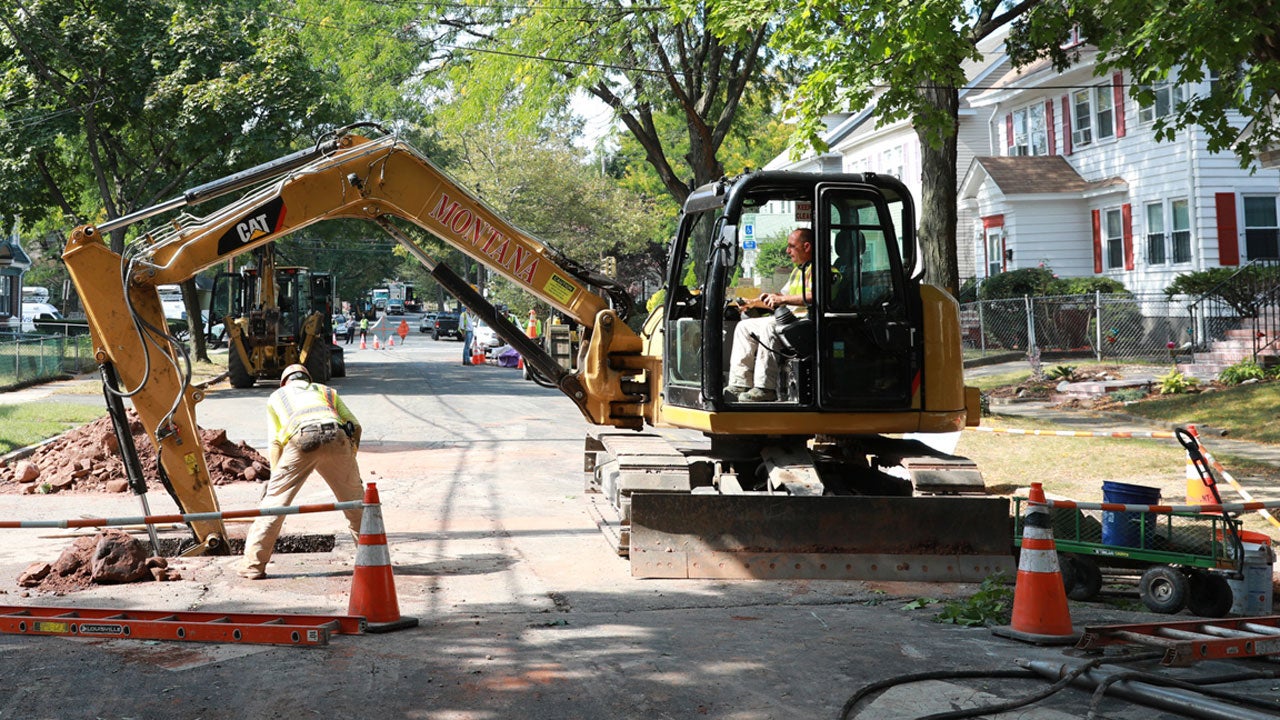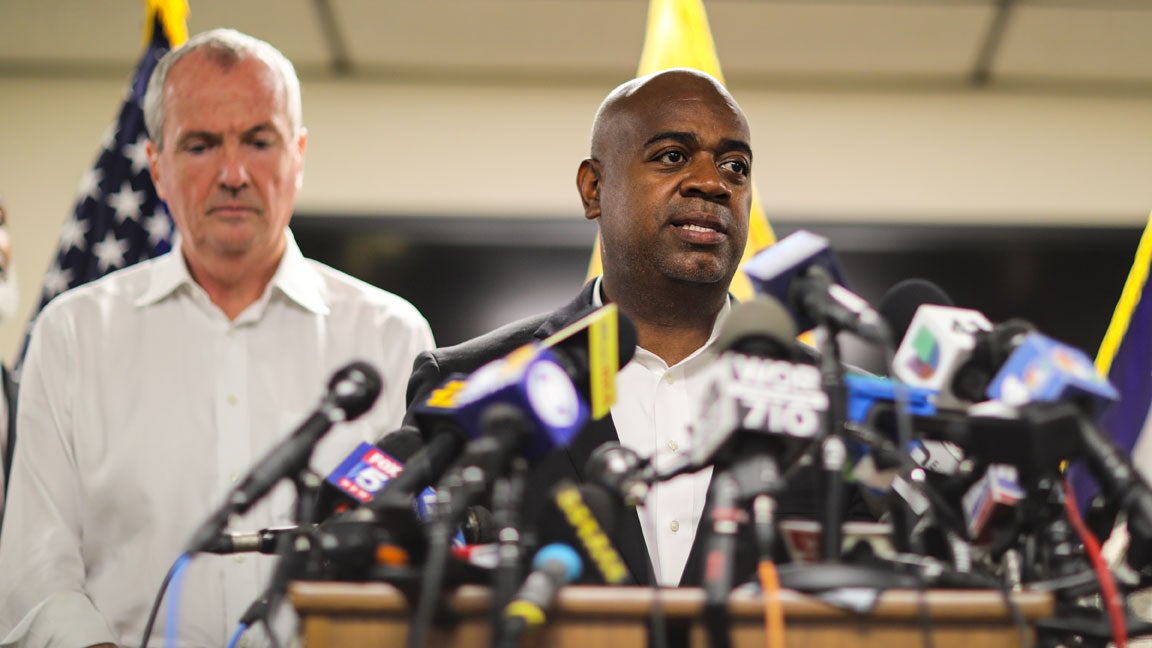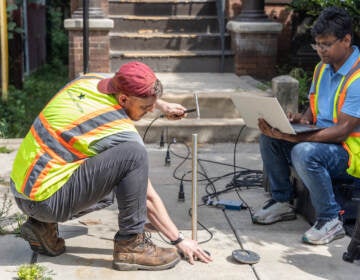Could Newark’s lead problems affect investment, development in resurgent city?
Health concerns are paramount. As those are being addressed, business interests seem to be weathering the storm

Downtown Newark has been transformed since the completion of NJPAC in 1997. (Twenty20)
This article was originally published on NJ Spotlight.
–
The New Jersey Performing Arts Center in Newark was full of fiery rhetoric when Mayor Ras Baraka took the stage at a public town hall meeting earlier this month to address the city’s lead water crisis.
The mayor had come under fire for the city’s handling of the crisis, and Baraka was on the defensive not just about his reputation but also about Newark’s.
“Don’t tell people ‘don’t invest in the city.’ Don’t tell businesses to leave the city,” Baraka said to the crowd. “Stop telling people our water is poisonous. . . Leave my damn city alone.”
Beyond the health concerns that are paramount, it has been a prevailing question since the problem with Newark’s lead service lines emerged: How much would the outcry and the headlines harm the city’s carefully cultivated revival efforts? Would they scare off investors, current and prospective? Would new developments stall, new tenants hedge?
It is still too early to tell the long-term effects, but interviews with a mix of businesspeople, academics, and residents indicate the city’s business interests so far seem to be weathering the storm, despite hiccups with the initial response to the crisis by the Baraka administration.
‘Not a doomsday scenario’
“What’s happening with the water has clearly put a cloud over Newark, but it’s not a doomsday scenario. And I think companies, including site selection companies, can walk and chew gum at the same time,” said John Boyd, principal of The Boyd Company, a Princeton-based corporate site selection, and economic development firm.
“The cost savings associated with Newark versus Manhattan has generated a lot of buzz in corporate America,” he said. “I think people recognize that the city will deal with this just as other cities have dealt with similar crises.”
In recent years, a wide range of investors and businesses have embraced Newark, opening new offices and returning to the city, a dramatic reversal of the flight seen after the 1967 riots. Racial and socioeconomic pressure detonated in a civic cataclysm during five tumultuous summer days in that year, leaving 26 people dead and millions of dollars in property damage. But all economic signs point to the fact that those who have been looking to invest in Newark do not now want to forego it, Boyd and others said.
“A major issue is will we as a country step up and improve the delivery infrastructure of water to our citizens in urban areas,” said Roland Anglin, former director of the Joseph C. Cornwall Center for Metropolitan Studies at Rutgers University-Newark, now dean of Cleveland State University’s Maxine Goodman Levin College of Urban Affairs. “The real question is what to do quickly so that we don’t choke off investment in a community that is coming back after a long stretch of non-investment.”
Downtown Newark has transformed in many ways since the completion of NJPAC in 1997. The Prudential Center, completed in 2007, brought professional sports and concert acts to the city’s core. Audible, the world’s largest seller and producer of digital spoken-word entertainment, moved to Newark from the suburbs the same year. Corporate development has accelerated since then, with Panasonic, Prudential and Mars Wrigley Confectionery respectively establishing, adding on to, or preparing to open a presence downtown, with all nearby the Mulberry Commons Park, the first phase of which opened this spring.
Newark’s current estimated population of 285,000 represents a slow rise, with the 2010 U.S. census marking the first time since the 1950s that the numbers have increased, not decreased. The hope for further residential growth is also partially centered in Newark’s downtown. The 2017 reopening of the refurbished Hahne & Co., with apartments and an upscale Whole Foods Market on Broad Street, combined with the construction of the first two new market-rate high-rise residential buildings in decades near Military Park, promotes the idea that a city with nearly $5 billion in projected economic development projects is finally back.
The commercial real estate market in Newark seems stable for now, despite the lead water issue. According to statistics from Cushman & Wakefield, a global commercial real estate services company, the average overall office vacancy rate in Newark for the first three quarters of 2019 is approximately 16%, below the 18% average for all northern New Jersey during the same time period.
But with the water crisis, the city has no doubt taken a hit, not just to its public health but also public relations.
In October 2018, the city began handing out what would eventually amount to over 38,000 free water filters, a year after Newark’s water system first exceeded federal lead standards. In August, the U.S. Environmental Protection Agency revealed testing results for three filters, showing that two had failed to work. The EPA then urged Newark residents to use bottled water for drinking and cooking until the results of the filter testing were fully understood and additional sampling was performed.
Testing results released last month showed that after collecting 1,700 samples from more than 300 Newark homes, more than 97% of PUR filters issued by the city reduce lead below 10 parts per billion, which is below the federal action level of 15 parts per billion. Meanwhile, bottled water distribution for residents of the western half of the city, who are serviced by the Pequannock water treatment plant with lead service lines that are affected by contamination, was discontinued on Oct. 8, with city authorities promoting the use of city-delivered filters to address the issue going forward.
The city began to replace lead service lines in March, estimating it would take eight to 10 years to replace 18,000 antiquated lead lines. Essex County Executive Joseph DiVincenzo Jr. then announced in August that the county would lend the city $120 million via a 30-year bond for the lead-line replacement program. As a result, it is now estimated the program will be completed in 24 to 30 months.
The city also announced earlier this month that some of the additional $155 million the city received from an extended lease agreement with the Port Authority would pay the debt service on the county loan. And it has another potential funding option as a result of President Donald Trump’s recent signing of a bill that would allow each of the 50 states to transfer up to $100 million from the federal Clean Water State Revolving Fund to the Drinking Water State Revolving Fund, which aims to address lead water contamination in drinking water across the country.
While there are now mechanisms in place for addressing the practical and physical components of the lead water crisis, a more difficult concern could be the reputational effect on Newark’s redevelopment. The city has had to overcome decades of disdain for developers to even consider investing, let alone execute plans. Memories of the 1967 riot fires still burn, clouding their view of Newark’s future.
Anglin framed the city’s future redevelopment in terms of what he considers the true nature of the lead water issue.
“Investors look at a risk profile, and this becomes part of an overall profile, so it really depends upon how much weight they put on this particular challenge.”
“I think of it as a public health crisis before I think of it is a crisis of investment. If we don’t take care of the public health crisis in the long term, that’s when you start to see shifts in investment patterns and people’s perception of Newark as a place to start and maintain a family, and as a place with a great economic outlook.”
Politics and optics also invariably will play a role in how Newark’s lead water crisis will continue to be handled, a phenomenon Boyd has seen before.
“I was having dinner with Michigan Governor Rick Snyder when the story broke about Flint. You could just see the stress on his face,” said Boyd, referring to the infamous, not-yet-fully resolved lead water contamination crisis that began in the Michigan city five years ago. Flint in 2014 switched over to a different water source as a cost-saving measure. But the state of Michigan reportedly did not direct the city to have a corrosion control plan in place when the change occurred, causing lead to leach off from pipes.
“The optics of the residents scared to drink water out of the faucet just took on a life of their own. But the Essex County-backed bond should be a game-changer. And this could be an opportunity for Mayor Baraka. This will be his legacy,” Boyd said. “And with the stakes so high, if things do not get better, there could be dire consequences for him.”
“As for Governor Phil Murphy, his power base is in Newark,” Boyd added. “He’s in that conversation about high stakes as well. Newark is really New Jersey’s most important city. This is the priority right now.”
The Baraka administration has consistently resisted any comparison of Newark’s lead water problem with Flint. Aisha Glover, former head of the Newark Community Economic Development Corporation and now president and CEO of the nonprofit Newark Alliance, ultimately believes that the city’s response to the lead water issue “will restore full faith and confidence in investors.”
“Once completed, this infrastructure upgrade will safeguard the water supply throughout the city and help eliminate any concerns for smaller developers, residents and local business owners,” Glover said.
“The swift and comprehensive response has already provided those of us focused on talent, investor and business attraction with a clear path forward with an end date and rationale behind the approach,” Glover said. “Fortunately for us, investment decisions take time and require a level of due diligence that extends beyond a news cycle.”
It is precisely the city’s response to the lead water crisis that has given some observers pause.
In July, the state’s Drinking Water Watch website showed that the city’s water exceeded federal limits for lead a fifth consecutive time since 2017, well before city authorities began handing out filters. Baraka’s tone regarding his administration’s early response has continued to be prickly and guarded, and he has publicly denied that there was any cover-up about high levels of lead in Newark’s water.
The Baraka administration has at times provided misleading information about lead in the city’s water. These pronouncements included an April 2018 statement on the city’s website.
“Our water fully complies with federal and state regulations,” said the city press release, issued shortly before the last citywide municipal election. “The city’s water is not contaminated with lead.”
In December 2018, the city signed a $225,000 contract with public relations firm Mercury Public Affairs to help handle its lead crisis messaging. Modia Butler, a partner at Mercury, played a key role in Baraka’s 2018 re-election campaign.
The city administration continues to fight litigation over its handling of the water crisis. The Natural Resources Defense Council, an environmental advocacy group, along with the Newark Education Workers Caucus filed a lawsuit against the city in June 2018, alleging it had violated the federal Safe Drinking Water Act. The NRDC maintains Newark has exceeded the federal action level for lead in homes since January 2017, failing to act swiftly after its corrosion control system was found to be not performing effectively, then understating the severity of the problem when it notified residents. The city has repeatedly and forcefully denied those claims.
For Newark’s redevelopment to continue at the pace seen in recent years, the city will have to work at rebuilding something more daunting and delicate than lead service replacement lines: trust.
“There’s no question that Newark needs to work really hard to regain confidence in the city’s water supply and how it’s being managed. And the only way to do that, I think, is to be transparent so the public can trust what they’re hearing,” said Chris Sturm, managing director for policy and water at New Jersey Future, a not-for-profit organization that promotes smart growth, redevelopment and infrastructure investments.
“There’s no question that people living in Newark, or considering moving to Newark, want to know that their water is safe, especially if they’re planning on having kids or have small children. And the city has to work three times as hard to reestablish that trust. I think it’s going to take time.”
Marjorie Perry, president, and CEO of MZM Construction and Management in Newark, discussed what Newark needs next to keep redevelopment moving forward.
She expressed concern that the controversy over the findings of a task force appointed by Gov. Murphy to probe into the New Jersey Economic Development Authority’s tax incentives, part of the struggle between the governor on one side and state Senate President Steve Sweeney with South Jersey power broker George Norcross III on the other, will prevent progress.
“I think our bigger issue is getting some incentive programs with the state Economic Development Authority going again,” said Perry, whose construction management firm provides a range of services, including work on sewer and replacement lines. “Maybe by the spring all the fever will have died down. I’m sure that’s the purpose of the [Essex County] bond. If you’re in Jersey City or New York, you have the same issue of old pipes running underneath the city.”
“The only thing that’s making this probably a little bit more damaging is that Mayor Baraka said at one time that the water was perfectly fine. And unfortunately, it’s not fine,” Perry said. “That’s the one statement that is probably driving all of this frenzy, as far as I’m concerned.”
“He’s got to go back out there, acknowledge it, take ownership of it, and say he’s going to make sure that going forward, without facts, there will be no information given. He’s going to have to repeat that over and over again. It’s going to take some time for some people to believe him. But somehow, he just has got to keep repeating that statement.”Population has been growing

‘Investors look at-risk profile’
High stakes for Mayor Ras Baraka

Questions about the city’s early response
Key task for mayor
WHYY is your source for fact-based, in-depth journalism and information. As a nonprofit organization, we rely on financial support from readers like you. Please give today.



